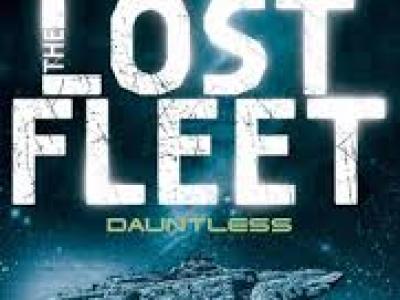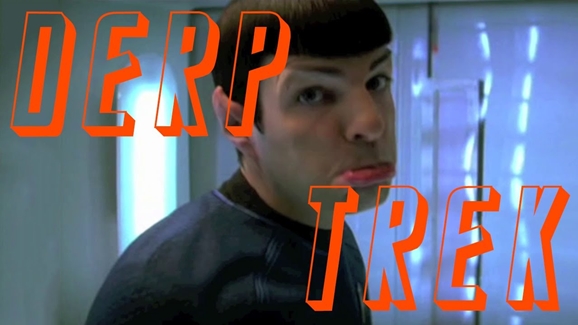
I just don't get enough reading done.
It's a horrid, vile and uncomfortable truth I have had to accept since I devoured the first three Expanse books, acquired the fourth part and have barely managed to get past the second chapter due to various intervening delays. It was, however, whilst driving around and quickly getting bored of my playlists (not an easy task given I still quite like them) that I suddenly decided to start forking out for audiobooks. And lo, I was saved! Once more the wonders of science fiction were renewed in my mind's eye as I drift through the countryside with parcels for the internet shoppers of Northern England.
This first review is something of a compilation of books: The Lost Fleet series by John G. Hemry, under the pen name of Jack Cambell, beginning with Dauntless, follwoed sequentially by Fearless, Courageous, Valiant, Relentless and ending the story ark with Victorious, under thel narrative stylings of Christian Rummel.
In a nutshell, this is bordering on a cross between military porn with a side of gratuitous lashings of quintessentially plausible spaceship battles, all neatly held together with the pretense of futturistic politics and character development in equal measure. That's not to say I didn't lap it all up like a thirsty Bantha at the only watering hole for miles. I got through all six audio books with some considerable speed despite my tentative first steps with the first book Dauntless.
This book, as with all galloping space operas, has the uneviable task of having to set the scene for the reader and actually hook the blighter within a remarkably harrowing number of initial paragraphs - a task I still decidedly dislike having to accomplish on my own. Fortunately for the reader, Dauntless introduces the universe through the eyes of the recently revived, post-humously promoted Captain John "Black Jack" Geary, an officer of the Fleet some hundred years prior who, after encountering a surprise attack from a hostile force, known as the Syndicate (Syndics for short), purchased enough time to allow his crew to escape and go out in a blaze of glory... sort of. He had managed to get in to a damaged escape capsule and did a bunk as his ship exploded around him only to discover that the distress beacon and propulsion units had all been knocked out and was left to float in space until the beginning of the first book.
Geary, during his absense has rather annoyingly been turned in to a hero of yore and has become something of a legend and also the point in to which galactic IQs spontaneously plummetted.
He's picked up by the flagship Dauntless as the fleet is on its way to the Syndic homeworld and what is believed to be the conclusion of a century old war. Things, however, do not quite work out as, at the beginning of the book, the leading character is thrust back in to the role of Captain and Acting Fleet Commander as the actual Fleet Admiral, along with many notable members of the brass are lined up and shot because... because Syndics are wankers, that's why.
And from this point forward, Captain Geary learns, much to his constant dismay, that the military he once knew and loved has actually devolved in to a pseudo-political mess of head-strong psychopaths with not even the faintest idea about tactics, even as a radical concept. Space battles at this point are little more than the equivalent of tucking your head down, priming all your weapons and running directly at the enemy with all the care and regard for safety as one might discover in a suicidal eagle with a rocket up its bum. Attrition is the name of the game and the game has absolutely no rules with regards to self-preservation.
Star Fleet they are not. Not even remotely...

Without giving away a massive amount of plot, Captain Geary is forced to come to terms with having to commanding his fleet which has been operating under a rather moronic amount of ship-by-ship autonomy, a militaristic nightmare political system that is determined by how terrifyingly thick the Captain of any given ship happens to be, an ongoing depletion of their stocks - from food to fuel, from ships to munitions, a positively galling amount of hero-worship from those that believe he has been returned to the Fleet by 'The Living Stars', the undulating relationships he maintains with various officers, the harrowing possibility of actually getting hoime and discovering that the drop in intelligence IS, in fact, universal and, linking all of the books together, the threat that there is something else out there pulling the strings behind the galactic conflict in a most nefarious manner.
As the reader progresses through the books it is fair to say that the characters actually do start to grow on you, in the same way that one might find that certain lego bricks become more or less useful in the fullness of your design plan. Some characters are evidently more charismatic or more efficient and, as a voyeur to Geary's mind set, it becomes clear to see that he's desperately trying to play with the cards he's been dealt, which, in truth is something of a mixed bag: from engineering officers who are good at their jobs but aren't very profficent at this whole 'command lark' to the belligerent and painfully annoying types that are clearly headed toward mutiny. Fortunately, geary has several characters about him that also tend to be quite formidable, intelligent and competent as officers and specialists. Each of these characters tend to fill certain niches for the story dynamic; awe-struck guides, paranoid political advisors, ship captains who either tend to be more savvy or more scientifically inclined. Each one slowly but surely gets a moment to shine in one regard or another and becomes are more intrinsic part of the plot to greater or lesser degrees depending on their immediate roles. This, however, doesn't stop them from getting killed on occassion.
Dauntless through to Victorious takes the Fleet from the Syndic homeworld on a tour-de-force through enemy territory, strategically stomping on enemy forces as they attempt to get home via various routes, desperately trying not to get blind-sided or ambushed by a significant enemy force. This means detours, and quite a few of them - most of which require Geary to deploy the kind of reasoning that a commanding officer in modern military forces would not feel the need to have to explain to their subordinates. But since the military of this fleet are entirely dependant on a crippled psuedo-political democratic shit-storm of incompetence, madness and good-old-fashioned suicidal tendancies it becomes of a question as to how long before Geary starts dumping some of them in an airlock just to get some 'clever' back in the room.

Which brings me to the writer...
Meet John G. Hemry...

This is a chap with a distinguished military history with the US Navy, ranging from gunnery control to intelligence. While there isn't a fantastic amount of detail on these previous occupations (which comes as no big surprise) there is a critical familiarity of the military politics, protocols and terminology that is brought to bear in the stories, with, and in no short order, a clear and rather detailed look at how space combat would more likely play out across the gulfs of space. His grasp of relativistic physics is quite clear when describing the space battles that dot the books and, if one were to, let's say, attempt to draw out the battle plans that Captain Geary divulges throughout the books (co-ordinates, positioning, relative velocity etc.) and effectively replay those battles with visual aids... (yeah? so what if I did?) it becomes quite a tangible experience.
There's also the rather healthy avoidance of tackling religion as it currently stands: no one remembers things like Christianity, Budhism, Hindi or any of those other pesky contemporary explanations for life, the universe and everything. Instead, Hemry / Campbell has settled upon a monotheistic priniciple of remembering your ancestors through the worship of the 'living stars', heralding to a more classical ideological reference one might recognise from the likes of King Arthur and his Knights or the Greek pantheon. There are no deities, as such, but the suggestion that folks have come to the conclussion that all matter and energy goes back to where it originall y came from, namely the stars, and finding solace and spiritual tranquility can be found having an introspective moment with the memory of your dead, be they family or that last poor shmuck that got smashed in to sub-atomic dust. It helped drive the stroy, gave characters the 'ooumph' they required to get on with stuff and also acted as a clear way to recap on any elements that the reader might require to be reminded of... usually suggesting that they were about to become relevant once more.
Add to this the plethora of examples of Geary dealing with his officers: continuously throughout the books, "Black Jack" is forced to maintain an aire of professionalism that, due to the reader's position, clearly irritates our tactical genius in the same way that one might refrain from hurtling in to a rage because someone of a less mentally agile nature has just stuffed their wet bits in to a power socket... again.
Not the point I was going to make, but for now this will just have to do... ;)
His wealth and familiarity with the source material is a real bonus to the telling of the tale. It hands the story another level of plausibility that science fiction really has come to rely upon given that the science fiction of yester year can now be openly mocked by even the least scientifically-savvy of fans... Yes, Star Wars, I'm looking at you. I've ALWAYS been looking at you. Mainly because I can't bring myself to glower at Lucas any longer...
Eeeuuurrgghh... just thinking about the walrus'-arse-for-a-face just makes me cringe...
So moving on...
Audiobooks have saved my life. And since this isn't just a review of the books, it's a review of Christian Rummel, who sat down and has narrated the first six books at least. Seriously, he may as well just go on and do the rest, he's half way there already. And by the time you get to Victorious it's clear that Rummel has managed to get right in to character and is well and truly versed with the material he's been reading. Heck, I suspect he might have even cared about the characters given that his vocal talents manage to find traction with each character with complete confidence by the third book. I can only imagine the hardship of getting to grips with a narrative, finding your flow, dedicating a finitie number of hours in a day, trying to sound fresh as a daisy with each take and ultimately sounding as though you've accomplished the entire task with just one take. After listening to various books now, along with other narrative styles, Rummel's depiction of the characters and their scenarios is nothing shy of an entirely admiral (see what I did there?) endeavour.
Rummel achieves a good inflection on character interactions whilst also offering a certain third-person-esque perspective when arriving at Geary's internal dialogue or his insights in to the advance in the cultural affectations.
All in all, a good yarn with sweeping space opera vibes. And since the story takes itself as seriously as it needs to without having to drum up unnecessary drama to distract away from the goals the characters have set themselves, the story shifts along at a very good pace throughout each book, engaging the reader with each chapter. Beware the technical parts, what few there actually are, unless you want to draw out diagrams and then try and replay them over Homeworld (Remastered)... you know... for research purposes or something... (WHAT!?! I LIKE RESEARCH!!!). It's worth noting that once you get to the end of Victorious, the story doesn't finish there. There is another couple of arks to follow, one set amongst the Syndics and another set as the space-faring civilizations slowly, but surely, become aware that something or someone is finally getting sick of these slack-jawed space-thugs and fancies putting an end to the levels of stupid in the universe.
Yeah, because picking a fight with a race of people that, even after a century of warfare, can't actually finish the other side off, on either side, should at least speak volumes about their temerity, if nothing else...
The Lost Fleeet was published by ACE Books.

